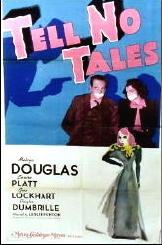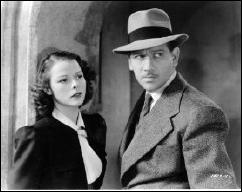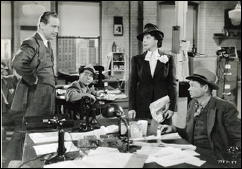Sat 27 Jul 2013
A Movie Review by Dan Stumpf: TELL NO TALES (1939).
Posted by Steve under Mystery movies , Reviews[13] Comments

TELL NO TALES. MGM, 1939. Melvyn Douglas, Louise Platt, Gene Lockhart, Douglass Dumbrille, Florence George. Dorector: Leslie Fenton.
Tell No Tales offers a Good Idea for a Movie, almost buried under MGM production gloss. Melvyn Douglas — who, in his day, starred opposite Greta Garbo and Boris Karloff with equal aplomb — plays a big-city newspaper editor who gets a break on a kidnapping case: a Hundred Dollar bill marked as part of the ransom payment falls into his hands. Using his connections and newsman’s instinct for a story, he follows the bill from hand to hand, back to the kidnappers.

This is fairly standard stuff for a 30s crime reporter story, but writer Lionel Houser milks a lot of extra interest from it. As Douglas tracks the bill from person to person, we get unsettling glimpses of the lives he’s walking in on: an older man whose pretty young wife bought a gift for another man with it; a black prizefighter who paid his doctor bill before dying or a prestigious singer afraid it will betray a sordid secret.
Writer Houser and director Leslie Fenton make the most of this Woolrichian bent (the scene at the prizefighter’s wake, held over a seedy nightclub, is particularly unsettling) with flashes of insight that lift this film well out of the ordinary.

Unfortunately, there is that MGM Gloss to contend with, and it almost suffocates a very intelligent little B-movie. At Warners, Tell No Tales would have established the lead character cracking a case with a quick montage of sirens, bullets and screaming headlines; Monogram would have opened the film with economic stock-footage and a wise-cracking talk on a pinch-penny Editor’s Office Set.
But not MGM. No sir. They open Tell No Tales with a big money shot of editor Douglas walking through a busy newsroom packed with extras, taking a few minutes of his (and our) time to give a break to an honest politician, and organizing a surprise party for file paper’s oldest employee, thus establishing him as a man of character and sensitivity (like all big city newspaper editors) and incidentally wasting about ten minutes of a one-hour movie.
The surprising thing is that once you get past this yawning chasm, Tell No Tales still manages to pack a lot of interest, thanks mainly to fine writing and the considerable charm of leading players Melvyn Douglas and the under-used Louise Platt (who played the pregnant army wife in Stagecoach that same year) seriously abetted by veteran nasties like Douglas Dumbrille and Leroy Mason.
Look for this one.
Editorial Comment: This movie has been reviewed once before on this blog, the earlier post contributed by David L. Vineyard. Check out what he had to say here.
WARNING: Part Two of the YouTube video provided is incomplete. (See Comment #1.)
July 28th, 2013 at 2:55 pm
Did you know the second YouTube video stops before the end of the movie? it *is* pretty good. Wish I could see the ending.
July 28th, 2013 at 6:19 pm
Ah, drat. No, I hadn’t had the time to watch the second one. I only started the first half and never got back to it. Sorry about that, but thanks for the warning.
I suppose it will all be moot someday anyway, if TCM ever decides to complain about their movies being uploaded to YouTube, and has them all pulled off.
July 28th, 2013 at 8:07 pm
Don’t get me wrong, I’m certainly no Commie or some such, quite to the contrary,but after such a long time, when practically everybody who helped create a work of art is long dead, it should be common property, and commercial ‘rights’ by some goofy corporation should simply end .
A lot of culturally important works , and I certainly count American entertainment movies among them, are practically lost and forgotten, because somebody sits on ‘rights’ that simply are absurd .
The Doc
July 28th, 2013 at 8:47 pm
It’s a complicated issue. The rights of the creators of works of art, no matter what media, have to be protected, no doubt about it, but I certainly have to agree with you, Doc. Whatever balance was established when the copyright system was first set up is long gone.
July 28th, 2013 at 9:20 pm
Yup, Steve, the rights of those PERSONS and their families, who create something ,have to be protected .
The rights of corporations, like Monsanto, have to be cut to normal and constitutional proportions.
And lobbying should be seen as what it is- institutionalised bribery .
The ordinary Joe, the people, have no lobby .
And art and culture, apart from artsyfartsylefty nonsense, have no lobby .
Let’s keep up our interest in at least parts of what people, humans, have created, and still create .
In books, movies, music, I mean. Not some new poison gas, or stuff.
The Doc
July 28th, 2013 at 11:13 pm
Steve and Doc —
Respectfully disagree. A corporation or production company or corparte individual commissions a screnplay and takes it to completion. Why should that be public domain…? Your automobile isn’t, nor your home…nor a Van Gogh painting.
As for Lobbying — the lobbyists do represent, among others, the everyday Joe. The most powerful of these groups are unions of one kind or another. I am not onside with them philosphically — but completely onside with their rights.
July 29th, 2013 at 12:10 am
Barry- just a thought- Jimmy Hoffa and the Mob representing the people of the United States ?
Union pinkos as the typical American ?
I have doubts . And as for the time exclusive rights are granted, I do think this could be open for discussion. Think of the horrendous amounts the IRS takes away, in the past up to 91% !
Think of estate tax, taking away what your parents and other forebears wanted YOU to have, for the ‘public good’ !
Taxes, their amounts and the ()/$%&$% that is done with them are the real scandal, not a certain reasonable limit to Copyrights for corporations that belong to who knows, anyway .
The Doc
July 29th, 2013 at 10:21 am
Doc —
All that you say is so — and it should not be. But, that doesn’t go to my contention that the right(s0 belong to the creator or to the entity writer-producer-director (in this case) has specified. As for the Hoffa crowd. Thumbs down on them — but that is not the way it was suppposed to work. Better law enforcement and less politicing should be the order of the day. Any day.
July 29th, 2013 at 4:20 pm
I’d make a distinction between real people and their natural heirs on the one hand, and corporations not held by these persons, on the other hand.
And look at the quality of guys poing into poltics- is that ALL that those countries can muster- those mediocre, lying /&%&$$§ ?
I mean, it is not that they’re asked to push a broom for a meal.
But that is all most of these men could be entrusted, at a maximum .
Boy, clean that yard, and don’t talk so much !
Well, not much we can do.
The Doc
July 29th, 2013 at 6:15 pm
Gents
This being a mystery-oriented blog and not a political one, I’ve become uncomfortable with the direction the comments on this post have gone. I know we live in a political world, but once in a while I think we need a sanctuary from it, and for me, Mystery*File is it.
So with the prerogative of being the guy in charge, I’m calling a halt to the present line of discussion, with apologies. Hope you understand!
July 29th, 2013 at 7:43 pm
10. Thank you.
July 30th, 2013 at 1:22 pm
Sometimes I think I’ve tuned into the wrong blog. What I’m really waiting for is Walker to tell us everything we need to know about PulpFest 2013.
July 30th, 2013 at 2:07 pm
Good news, Randy. Walker’s sent me his report and I’m hoping I have time to get it posted later today.